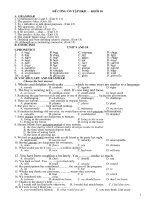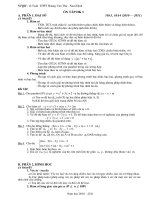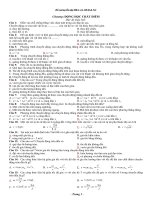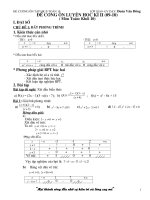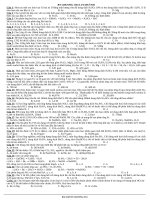De cuong on tap HKII lop 10 CB co DA
Bạn đang xem bản rút gọn của tài liệu. Xem và tải ngay bản đầy đủ của tài liệu tại đây (87.87 KB, 9 trang )
§Ò c¬ng «n tËp HKII khèi 10–
A. Grammar
1. Conditional type 2 and 3. (Unit 9, 11)
2. The passive voice. (Unit 10)
3. To + infinitive to talk about purposes. (Unit 12)
4. Wh-questions. (Unit 12)
5. Adjectives of attitute. (Unit 13)
6. It be not until…..that… (Unit 13)
7. The articles: A/An, the. (Unit 13)
8. The simple future tense. (Unit 14)
9. Defining and Non-defining relative clauses. (Unit 15)
10. Although as a contrasting connector. (Unit 15)
B. exercises
Unit 9 and 10
I. Phonetics
1.
A. beef
B. beer C. engineer D. cheer
2. A. hair B. chair
C. fail
D. fairy
3. A. leave
B. bear
C. peace D. cheap
4. A. near B. here C. ear
D. meat
5. A. gulf B. hunt
C. sure
D. current
6.
A. great
B. feat C. seat D. beat
7. A. campfire
B. part
C. animal D. natural
8. A. probably B. valuable
C. bomb
D. baby
9. A. environment B. hydroelectric
C. circulation
D. wild
10. A. unit B. university C. unity
D. umbrella
II. Vocabulary and Grammar
Choose the best answer
1. Whales and dolphins both make ............ which in some ways are similar to a language.
A. sounds
B. symbols C. signals D. sighs
2. The boy is wearing a(n)............. shirt. It’s too long and loose.
A. oversized
B. medium-sized C. cmall-sized D. large-sized
3. Reducing the gap between rich and poor is one of the main ............ facing the government.
A. challenging
B. challenges
C. challenger D. challenge
4. There are various .............. and animals in tropical forests.
A. plantations B. planter
C. plants
D. plant
5. She gave me a ............. look and said nothing.
A. mysteriously B. mystery C. mysteries
D. mysterious
6. If modern technology did not exist, we would have never such precious information.
A. valuable
B. precise C. confidential D. detailed
7. Some marine animals are dangerous to humans.
A. living in the mountain
B. living in the ocean
C. living in the forest D. living in the house
8. Human infants have gestation period of nine months.
A. the time during which a human baby develops inside its mother.
B. the time when stomach digests food.
C. the time of eating food.
D. the time of growing up.
9. We had an accidental meeting with an old friend at the party last night.
A. unpleasant
B. unexpected
C. unlucky D. unacceptable
10. Strong currents are dangerous for swimmers.
A. suits
B. flows
C. sea D. climates
11. What would you do if you ........... a million dollars?
A. win
B. won
C. had won D. will win
1
12. You have been coughing a lot lately. You ............ smoke so much.
A. shouldn t’
B. can’t C. should D. can
13. You look so tired. You ........... go to bed early.
A. will B. must
C. should
D. would
14. Her participation has contributed ............ the success of the program.
A. on B. in C. for
D. to
15. Whales and sharks are carnivores, ............ means they eat meat.
A. this B. that C. it
D. which
16. We wondered why ............ a tip.
A. to leave B. should we leave
C. we should leave
D. don’t we leave
17. Thanks to the doctor’s help ............... .
A. I would still feel bad now otherwise. B. I would feel much better.
C. I feel fine now.
18. If I were to say I liked you, ..................... .
A. you would have fainted.
B. what would you do?
C. you may think I am crazy.
19. I would like her more, ............... .
A. if she was not that cunning.
B. if she gives me some of her money.
C. if she admits that she likes me.
20. I will never talk to you again ............ you apologize me ............. your being so rude.
A. if/ for
B. unless/ for
C. or/ of D. whether/ of
Iii. Reading
Circle the best option to complete this passage
Dolphins are known as cetaceans, or marine (1) .............: they breathe air, they are warm-blood,
and they bear live young ones called (2) .............. .
The size of dolphins vary greatly. The smallest dolphin is just about 50 kg in weight and 1.2
meters in length (3) .............. the largest one can weigh up to 8.200 kg and is 10 meters long.
Dolphins are sociable creatures. They swim together in group known as (4) ............. . They show
great ability in the water and you can often (5) ............... them playing (6) .............. ships. Dolphins are
interested in humans and often rescue people in the sea (7) ............. are in danger. They are intelligent
creatures and make sounds to (8) ............... with each other. Scientists have studied dolphins (9) .............
many years and are now looking into the possibility of dolphins (10) ............. able to carry out tasks
under the sea.
1. A. fish B. creatures
C. mammals
D. life
2. A. babies
B. calves
C. young D. diets
3. A. when B. as
C. while
D. since
4. A. currents B. flocks C. herds
D. schools
5. A. look down
B. come across
C. run after D. go by
6.
A. around
B. on C. in D. next
7. A. which B. they C. when
D. who
8. A. talk B. contact
C. communicate
D. connect
9. A. in B. since
C. for
D. during
10. A. be
B. being
C. are D. that are
Read the passage, then circle the best answers.
We are all slowly destroying the earth. The seas and rivers are too dirty to swim in. There is so
much smoke in the air that it is unhealthy to live in many of the world’s cities. In one well-known city,
for example, poisonous gases from car pollute the air so much that traffic policemen have to wear
oxygen masks.
We have cut down so many trees that there are now vast areas of wasteland all over the world.
As a result, farmers in parts of Africa cannot grow enough to eat. In certain countries in Asia there is too
little rice. Moreover, we do not take enough care of the countryside. Wild animals are quickly
disappearing. For instant, tigers are rate in India now because we have killed too many for them to
survive. However, it isn’t enough simply to talk about the problem. We must act now before it is too late
to do anything about it. Join us now. Save the Earth. This is too important to ignore.
1. The seas and rivers nowadays .................................. .
A. cannot be swum in B. are less dirty than they used to be
2
C. are dirty enough to swim in
D. are contaminated
2. Smoke ............................. .
A. is harmful to health
B. is full of the big cities
C. causes an healthy life D. makes life in big cities difficult
3. In one well-known city, traffic policemen have to wear oxygen masks ................ .
A. in order to protect themselves form being injured B. in spite of poisonous gases
C. because there are so many cars on the streets
D. because of air pollution
4. Why do farmers in parts of Africa and Asia not grow enough to eat?
A. Because many trees have been planted.
B. Because people cut down many trees.
C. Because there is too little rice.
D. Because there are large areas of land that cannot be used.
5. Wild animals are ......................................... .
A. in danger of extinction
B. being protected from natural environment
C. so rare that they cannot survive D. killed so many that they cannot live in the forests
6. What is the best title for the passage?
A. Conservation B. Protect the Nature! C. The Environment
D. Save the Earth
iV. Writing
Circle the best sentences which have the same meanings as the original ones
1. Tom hasn’t got satellite TV, so he can’t watch the game.
If .......................................................................................... .
A. Tom has satellite TV, he can watch the game.
B. Tom has got satellite TV, he would able to watch the game.
C. Tom had satellite TV, he could watch the game.
D. Tom would have satellite TV, he could watch the game.
2. Walking home alone is not a good idea.
You ...................................................................................... .
A. can’t walk home alone. B. mustn’t walk home alone.
C. don’t have to walk home alone.
D. shouldn t walk home alone.’
3. “Did someone ring you an hour ago?” Martin said to Susan.
Martin asked Susan ............................................................. .
A. whether anyone rang her an hour ago.
B. if someone had rung her an hour before.
C. whether someone rang him an hour ago. D. if anyone had rung her an hour before.
4. Throw a stone into water and it sinks.
If ........................................................................................ .
A. you threw a stone into water, it would sink.
B. a stone is thrown into water, it may sink.
C. you will throw a stone into water, it sinks.
D. you throw a stone into water, it sinks.
5. You can’t travel on this train unless you have a reservation.
If ...................................................................................... .
A. you have a reservation, you can’t travel on this train.
B. you don t have a reservation, you can t travel on this train.’ ’
C. you don’t have a reservation, you can travel on this train.
D. you won’t have a reservation, you can’t travel on this train.
Rewrite the following sentences which have the same meanings as the original ones.
1. We don’t visit you very often because you live so far away.
If you .................................................................................................................................................
2. That book is too expensive, so I’m not going to buy it.
If the book .........................................................................................................................................
3. We don’t go out very often because we can’t afford it.
If we .................................................................................................................................................
4. It’s raining, so we can’t have lunch on the patio.
If it .....................................................................................................................................................
3
5. Water these plants or they will wither.
If you .................................................................................................................................................
Change into passive voice
1. The factory is producing more and more pollution.
More and more pollution is being produced.
2. Alexander Fleming discovered penicillin in 1928.
Penicillin was discovered in 1928.
3. Millions of people watch this programme.
This programme is watched.
4. The city council has banned traffic from the city centre.
Traffic has been banned from the city centre.
5. Somebody will meet you at the bus station.
You will be met at the station.
6. They are going to build more schools for disabled children.
More schools are going to be built for disabled children.
7. Mr. John hasn’t taught that course since 1985.
That course hasn t been taught sine 1985.’
8. Is a student pilot flying that airplane?
Is that airplane being flown by a student pilot?
9. Alan’s knowledge of art doesn’t impress me.
I am not impressed by Alan s knowledge of art.’
10. Did Sue knock that vase to the floor?
Was that vase knocked to the floor?
Give the right form of verbs in brackets.
1. If my grandfather (be) still alive, he would be a hundred today.
2. I (offer) to give you a lift if I had my car here.
3. Where (you/ choose) if you could live anywhere in the world?
4. If you (drive) from London to Glasgow, which way would you go?
5. If I (live) out of town, I (take) up the garden.
Unit 11 and 12
I. Phonetics
1.a. parked
b. played c. stayed d. loved
2.a. study b. abandon
c. Wednesday
d. world
3.a. visit
b. because c. answer d. poison
4.a. business b. serious c. compose
d. easily
5.a. answer b. listen
c. music
d. solemn
6. a. pushed b. watched
c. learned
d. danced
7. a. laughed
b. closed c. filled d. studied
8. a. sit b. sand
c. leaves
d. star
9. peas
b. piece c. pence d. let’s
10. a. outside b. instead c. exciting
d. surprising
II. Vocabulary and Grammar
Choose the best answer
1.Tuan Chau island is __________150 kms north east of Hanoi.
a. located
b. stood c. placed D, bordered
2.This park was________before World War II.
A. set
b. established
c. located d. stationed
3.Music can express one’s anger, love, hate and____________
a. friends b. friendness c. friendships
d. friendship
4.Tien Quan Ca is the Viet Nam national__________, was written by Van Cao
a. folk song
b. anthem
c. epic d. pop song
4
5.The park _________hundreds of species of endangered animals.
a. contains
b. consists
c. composes d. holds
6. Farmers earn their livings mainly by doing ………………
a. selling
b. farming
d. trading d. growing
7. We can …………… with people in most parts of the world by telephone.
a. communicating
b. communicate
c. communicative d. communication
8. The mother ……….. the baby to sleep with her sweet voice everynight.
a. lulls
b. lullaby c. lulling d. has lulled
9. Men often find it hard to express their …………..
a. motional
b. emotion
c. emotional d. motion
10. He wouldn’t have had an accident if he …………… more carefully.
a. drives b. drove
c. had driven
d. was driving
11. If Linda ………….. her the money, Sophie wouldn’t have bought the stereo system.
a. hadn t lent’
b. didn’t lend c. hasn’t lent d. doesn’t lend
12. I prefer Jazz_______Rock music
a. to
b. than c. more d. over
13.If I____________too much, I wouldn’t have felt so sick now.
a. didn’t eat b. don’t eat
c. hadn t eaten’
d. haven’t eaten
14.If he had revised for the exam hard, he _________it.
a. passed
b. would have passed
c. had passed d. has passed
15.The schoolboys are in a hurry__________to miss their school bus.
a. not b. in order
c. in order not
d. so as
16.Trees were planted along the street_____________traffic noise.
a. reducing
b. to reduce
c. so that reduce d. not to reduce
17. I spent the evening …………. with my friends.
a. to chat
b. chatting
c. chat d. for chatting
18. There were no chairs …………. on, so we all had to sit on the floor.
a. sits b. to sit c. sitting d. sat
19. I went out ………… a letter.
a. mailing
b. to mail
c. mails d. for mailing
20. The Prime Minister has three bodyguards …………. him.
a. to protect
b. protected c. protect d. protects
Iii. Reading
Read the passage, then answer the questions below it
Conservation is the safeguarding and presevation of natural resources, so that they can continue
to be used and enjoyed. In the past, most people believed that the world resources could never be used
up. Today, we know that it is not true. An important part of conservation is the prevention of waste –
waste of forests, soil, wild-life, monerals and human lives. As important is the fight against pollution of
our environment, in particular, the dirtying and poisoning of air and water. Conservation is also
concerned with the reclaiming of land by irrigating desert, draining swamps or pushing back the sea.
1. What is conservation?
Conservation is the safeguarding and presevation of natural resources
2. Will the world’s resources never be used up?
Yes, they will.
3. What is concerned with the prevention of waste?
Things concerned with the prevention of waste are waste of forests, soil, wild-life, monerals and
human lives.
4. How can we reclaim land?
We can reclaim land by irrigating desert, draining swamps or pushing back the sea.
Read the passage, then circle the best answer
5
